Organisational Learning, Change Management: Essay Analysis
VerifiedAdded on 2023/01/12
|8
|2081
|94
Essay
AI Summary
This essay delves into the concepts of organisational learning, strategic and innovative change management, and their impact on company growth in a competitive environment. It examines key theories of organisational learning, including the work of Argryis and Schon, and identifies four units where knowledge creation occurs. The essay highlights five key barriers to organisational learning, such as resistance to change and lack of leadership skills, and proposes four strategies to improve organisational learning, including designing for growth and fostering guided adaptation. The analysis integrates the concepts with leadership theory and practice, emphasizing the need for companies to adapt and evolve in a rapidly changing business world to achieve high performance. The essay also references relevant literature to support its arguments.
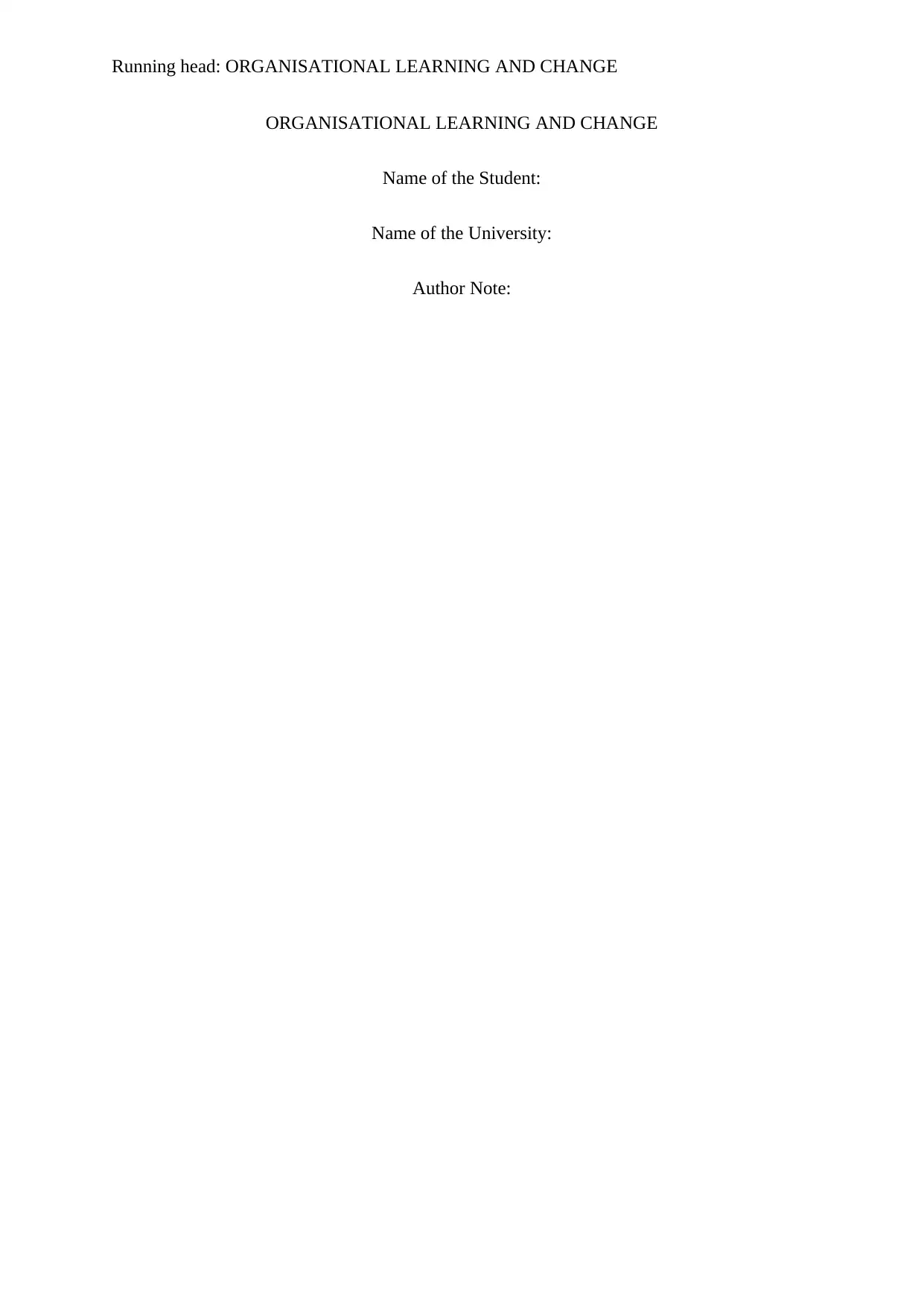
Running head: ORGANISATIONAL LEARNING AND CHANGE
ORGANISATIONAL LEARNING AND CHANGE
Name of the Student:
Name of the University:
Author Note:
ORGANISATIONAL LEARNING AND CHANGE
Name of the Student:
Name of the University:
Author Note:
Paraphrase This Document
Need a fresh take? Get an instant paraphrase of this document with our AI Paraphraser
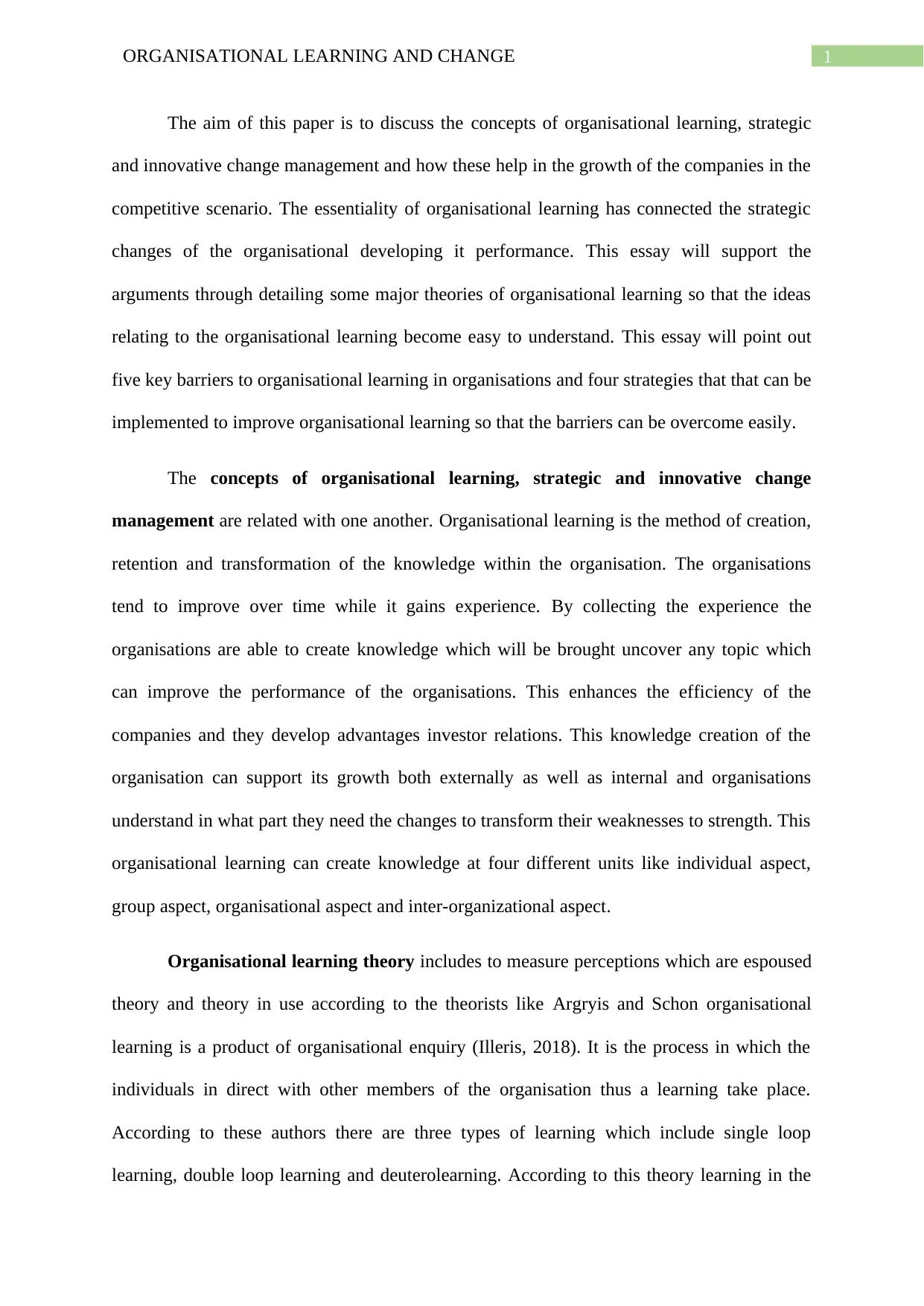
1ORGANISATIONAL LEARNING AND CHANGE
The aim of this paper is to discuss the concepts of organisational learning, strategic
and innovative change management and how these help in the growth of the companies in the
competitive scenario. The essentiality of organisational learning has connected the strategic
changes of the organisational developing it performance. This essay will support the
arguments through detailing some major theories of organisational learning so that the ideas
relating to the organisational learning become easy to understand. This essay will point out
five key barriers to organisational learning in organisations and four strategies that that can be
implemented to improve organisational learning so that the barriers can be overcome easily.
The concepts of organisational learning, strategic and innovative change
management are related with one another. Organisational learning is the method of creation,
retention and transformation of the knowledge within the organisation. The organisations
tend to improve over time while it gains experience. By collecting the experience the
organisations are able to create knowledge which will be brought uncover any topic which
can improve the performance of the organisations. This enhances the efficiency of the
companies and they develop advantages investor relations. This knowledge creation of the
organisation can support its growth both externally as well as internal and organisations
understand in what part they need the changes to transform their weaknesses to strength. This
organisational learning can create knowledge at four different units like individual aspect,
group aspect, organisational aspect and inter-organizational aspect.
Organisational learning theory includes to measure perceptions which are espoused
theory and theory in use according to the theorists like Argryis and Schon organisational
learning is a product of organisational enquiry (Illeris, 2018). It is the process in which the
individuals in direct with other members of the organisation thus a learning take place.
According to these authors there are three types of learning which include single loop
learning, double loop learning and deuterolearning. According to this theory learning in the
The aim of this paper is to discuss the concepts of organisational learning, strategic
and innovative change management and how these help in the growth of the companies in the
competitive scenario. The essentiality of organisational learning has connected the strategic
changes of the organisational developing it performance. This essay will support the
arguments through detailing some major theories of organisational learning so that the ideas
relating to the organisational learning become easy to understand. This essay will point out
five key barriers to organisational learning in organisations and four strategies that that can be
implemented to improve organisational learning so that the barriers can be overcome easily.
The concepts of organisational learning, strategic and innovative change
management are related with one another. Organisational learning is the method of creation,
retention and transformation of the knowledge within the organisation. The organisations
tend to improve over time while it gains experience. By collecting the experience the
organisations are able to create knowledge which will be brought uncover any topic which
can improve the performance of the organisations. This enhances the efficiency of the
companies and they develop advantages investor relations. This knowledge creation of the
organisation can support its growth both externally as well as internal and organisations
understand in what part they need the changes to transform their weaknesses to strength. This
organisational learning can create knowledge at four different units like individual aspect,
group aspect, organisational aspect and inter-organizational aspect.
Organisational learning theory includes to measure perceptions which are espoused
theory and theory in use according to the theorists like Argryis and Schon organisational
learning is a product of organisational enquiry (Illeris, 2018). It is the process in which the
individuals in direct with other members of the organisation thus a learning take place.
According to these authors there are three types of learning which include single loop
learning, double loop learning and deuterolearning. According to this theory learning in the
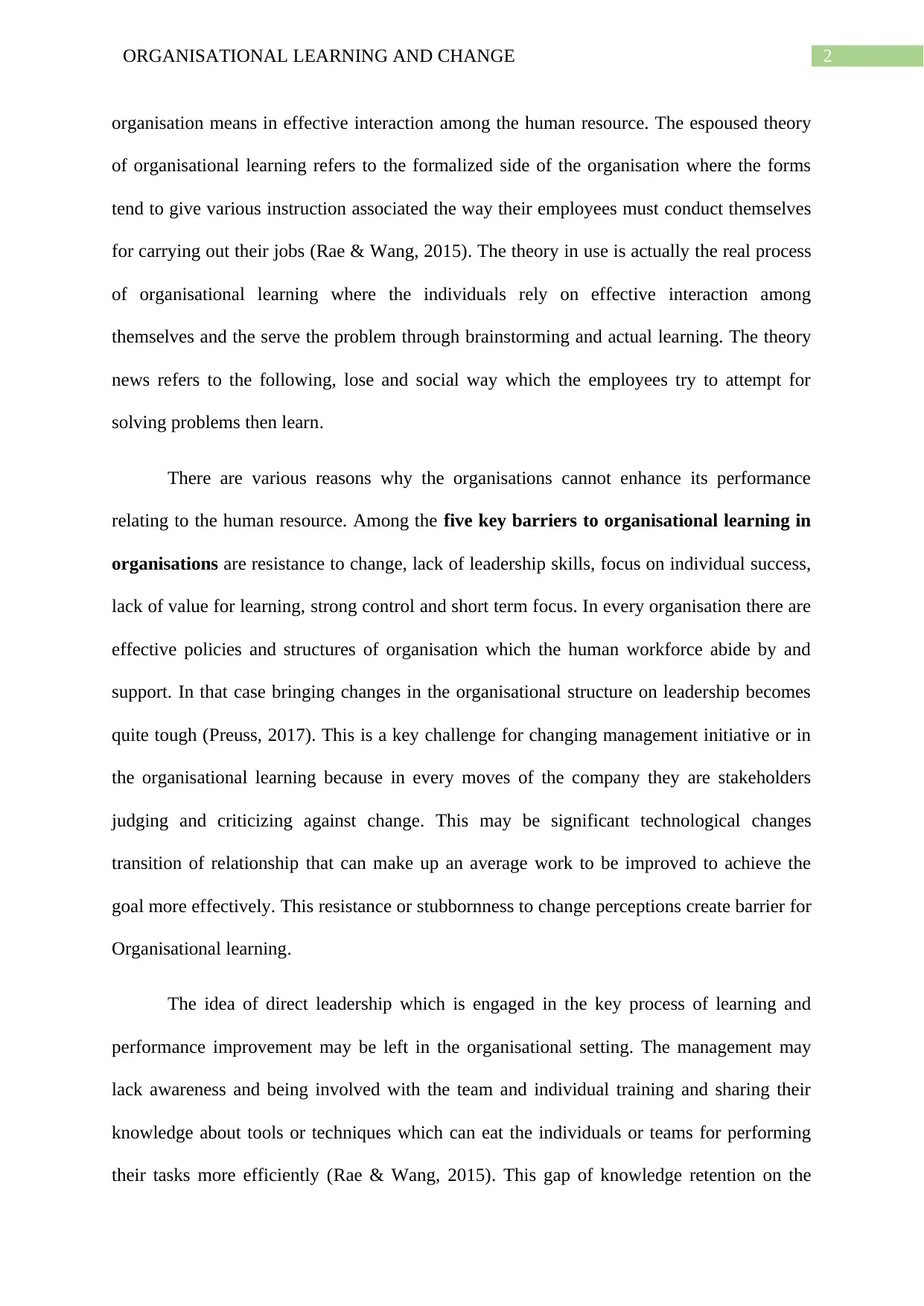
2ORGANISATIONAL LEARNING AND CHANGE
organisation means in effective interaction among the human resource. The espoused theory
of organisational learning refers to the formalized side of the organisation where the forms
tend to give various instruction associated the way their employees must conduct themselves
for carrying out their jobs (Rae & Wang, 2015). The theory in use is actually the real process
of organisational learning where the individuals rely on effective interaction among
themselves and the serve the problem through brainstorming and actual learning. The theory
news refers to the following, lose and social way which the employees try to attempt for
solving problems then learn.
There are various reasons why the organisations cannot enhance its performance
relating to the human resource. Among the five key barriers to organisational learning in
organisations are resistance to change, lack of leadership skills, focus on individual success,
lack of value for learning, strong control and short term focus. In every organisation there are
effective policies and structures of organisation which the human workforce abide by and
support. In that case bringing changes in the organisational structure on leadership becomes
quite tough (Preuss, 2017). This is a key challenge for changing management initiative or in
the organisational learning because in every moves of the company they are stakeholders
judging and criticizing against change. This may be significant technological changes
transition of relationship that can make up an average work to be improved to achieve the
goal more effectively. This resistance or stubbornness to change perceptions create barrier for
Organisational learning.
The idea of direct leadership which is engaged in the key process of learning and
performance improvement may be left in the organisational setting. The management may
lack awareness and being involved with the team and individual training and sharing their
knowledge about tools or techniques which can eat the individuals or teams for performing
their tasks more efficiently (Rae & Wang, 2015). This gap of knowledge retention on the
organisation means in effective interaction among the human resource. The espoused theory
of organisational learning refers to the formalized side of the organisation where the forms
tend to give various instruction associated the way their employees must conduct themselves
for carrying out their jobs (Rae & Wang, 2015). The theory in use is actually the real process
of organisational learning where the individuals rely on effective interaction among
themselves and the serve the problem through brainstorming and actual learning. The theory
news refers to the following, lose and social way which the employees try to attempt for
solving problems then learn.
There are various reasons why the organisations cannot enhance its performance
relating to the human resource. Among the five key barriers to organisational learning in
organisations are resistance to change, lack of leadership skills, focus on individual success,
lack of value for learning, strong control and short term focus. In every organisation there are
effective policies and structures of organisation which the human workforce abide by and
support. In that case bringing changes in the organisational structure on leadership becomes
quite tough (Preuss, 2017). This is a key challenge for changing management initiative or in
the organisational learning because in every moves of the company they are stakeholders
judging and criticizing against change. This may be significant technological changes
transition of relationship that can make up an average work to be improved to achieve the
goal more effectively. This resistance or stubbornness to change perceptions create barrier for
Organisational learning.
The idea of direct leadership which is engaged in the key process of learning and
performance improvement may be left in the organisational setting. The management may
lack awareness and being involved with the team and individual training and sharing their
knowledge about tools or techniques which can eat the individuals or teams for performing
their tasks more efficiently (Rae & Wang, 2015). This gap of knowledge retention on the
⊘ This is a preview!⊘
Do you want full access?
Subscribe today to unlock all pages.

Trusted by 1+ million students worldwide
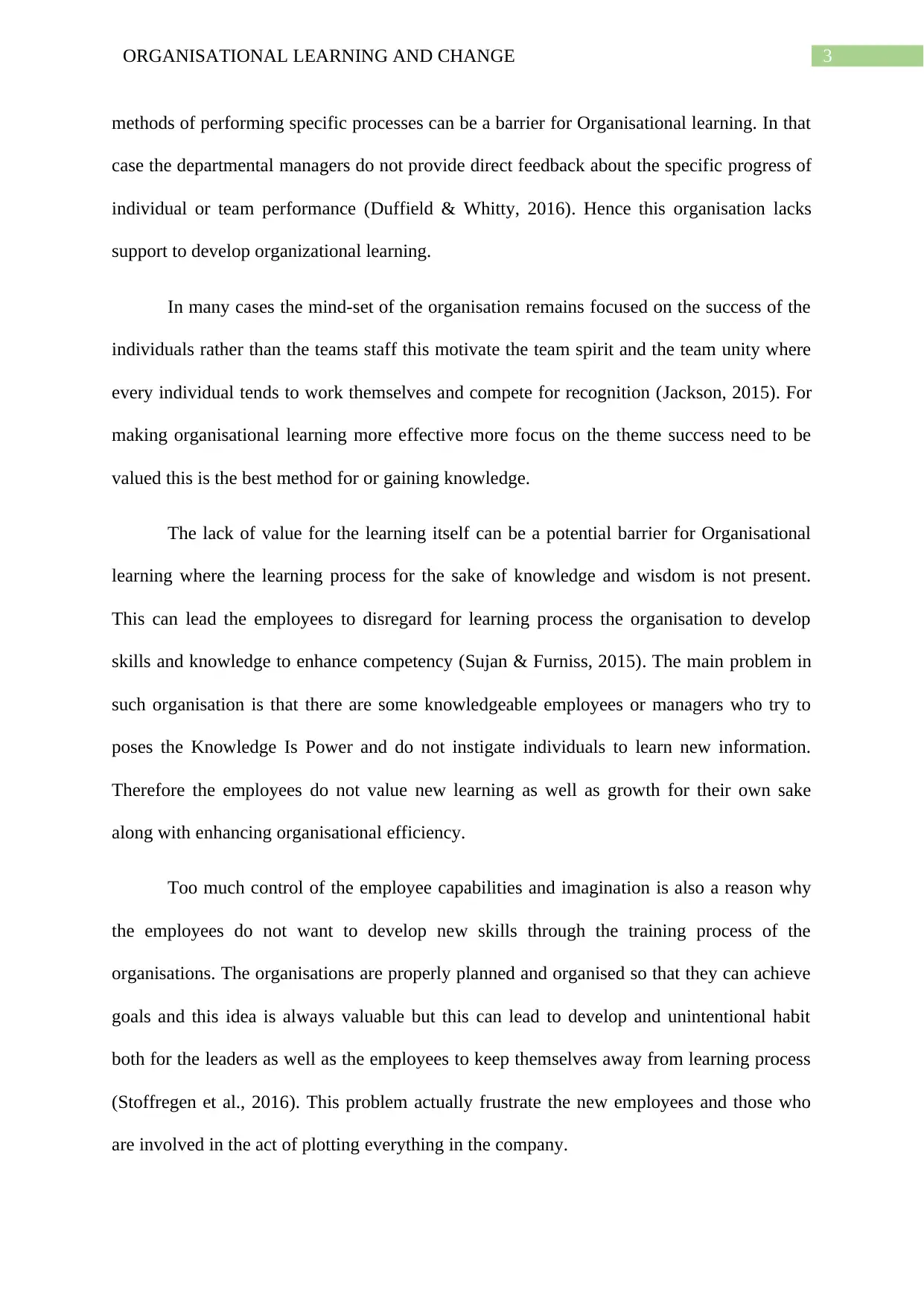
3ORGANISATIONAL LEARNING AND CHANGE
methods of performing specific processes can be a barrier for Organisational learning. In that
case the departmental managers do not provide direct feedback about the specific progress of
individual or team performance (Duffield & Whitty, 2016). Hence this organisation lacks
support to develop organizational learning.
In many cases the mind-set of the organisation remains focused on the success of the
individuals rather than the teams staff this motivate the team spirit and the team unity where
every individual tends to work themselves and compete for recognition (Jackson, 2015). For
making organisational learning more effective more focus on the theme success need to be
valued this is the best method for or gaining knowledge.
The lack of value for the learning itself can be a potential barrier for Organisational
learning where the learning process for the sake of knowledge and wisdom is not present.
This can lead the employees to disregard for learning process the organisation to develop
skills and knowledge to enhance competency (Sujan & Furniss, 2015). The main problem in
such organisation is that there are some knowledgeable employees or managers who try to
poses the Knowledge Is Power and do not instigate individuals to learn new information.
Therefore the employees do not value new learning as well as growth for their own sake
along with enhancing organisational efficiency.
Too much control of the employee capabilities and imagination is also a reason why
the employees do not want to develop new skills through the training process of the
organisations. The organisations are properly planned and organised so that they can achieve
goals and this idea is always valuable but this can lead to develop and unintentional habit
both for the leaders as well as the employees to keep themselves away from learning process
(Stoffregen et al., 2016). This problem actually frustrate the new employees and those who
are involved in the act of plotting everything in the company.
methods of performing specific processes can be a barrier for Organisational learning. In that
case the departmental managers do not provide direct feedback about the specific progress of
individual or team performance (Duffield & Whitty, 2016). Hence this organisation lacks
support to develop organizational learning.
In many cases the mind-set of the organisation remains focused on the success of the
individuals rather than the teams staff this motivate the team spirit and the team unity where
every individual tends to work themselves and compete for recognition (Jackson, 2015). For
making organisational learning more effective more focus on the theme success need to be
valued this is the best method for or gaining knowledge.
The lack of value for the learning itself can be a potential barrier for Organisational
learning where the learning process for the sake of knowledge and wisdom is not present.
This can lead the employees to disregard for learning process the organisation to develop
skills and knowledge to enhance competency (Sujan & Furniss, 2015). The main problem in
such organisation is that there are some knowledgeable employees or managers who try to
poses the Knowledge Is Power and do not instigate individuals to learn new information.
Therefore the employees do not value new learning as well as growth for their own sake
along with enhancing organisational efficiency.
Too much control of the employee capabilities and imagination is also a reason why
the employees do not want to develop new skills through the training process of the
organisations. The organisations are properly planned and organised so that they can achieve
goals and this idea is always valuable but this can lead to develop and unintentional habit
both for the leaders as well as the employees to keep themselves away from learning process
(Stoffregen et al., 2016). This problem actually frustrate the new employees and those who
are involved in the act of plotting everything in the company.
Paraphrase This Document
Need a fresh take? Get an instant paraphrase of this document with our AI Paraphraser
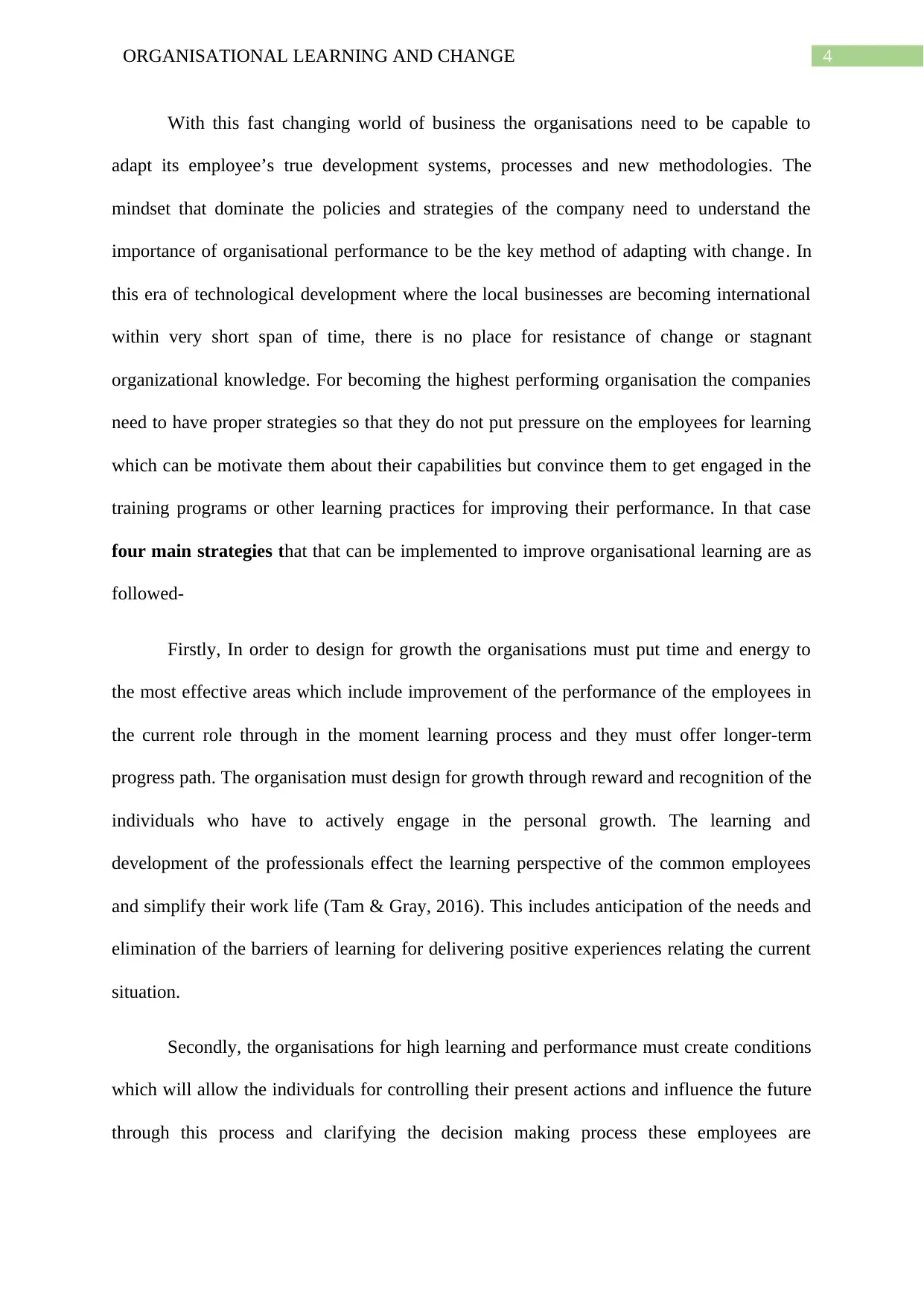
4ORGANISATIONAL LEARNING AND CHANGE
With this fast changing world of business the organisations need to be capable to
adapt its employee’s true development systems, processes and new methodologies. The
mindset that dominate the policies and strategies of the company need to understand the
importance of organisational performance to be the key method of adapting with change. In
this era of technological development where the local businesses are becoming international
within very short span of time, there is no place for resistance of change or stagnant
organizational knowledge. For becoming the highest performing organisation the companies
need to have proper strategies so that they do not put pressure on the employees for learning
which can be motivate them about their capabilities but convince them to get engaged in the
training programs or other learning practices for improving their performance. In that case
four main strategies that that can be implemented to improve organisational learning are as
followed-
Firstly, In order to design for growth the organisations must put time and energy to
the most effective areas which include improvement of the performance of the employees in
the current role through in the moment learning process and they must offer longer-term
progress path. The organisation must design for growth through reward and recognition of the
individuals who have to actively engage in the personal growth. The learning and
development of the professionals effect the learning perspective of the common employees
and simplify their work life (Tam & Gray, 2016). This includes anticipation of the needs and
elimination of the barriers of learning for delivering positive experiences relating the current
situation.
Secondly, the organisations for high learning and performance must create conditions
which will allow the individuals for controlling their present actions and influence the future
through this process and clarifying the decision making process these employees are
With this fast changing world of business the organisations need to be capable to
adapt its employee’s true development systems, processes and new methodologies. The
mindset that dominate the policies and strategies of the company need to understand the
importance of organisational performance to be the key method of adapting with change. In
this era of technological development where the local businesses are becoming international
within very short span of time, there is no place for resistance of change or stagnant
organizational knowledge. For becoming the highest performing organisation the companies
need to have proper strategies so that they do not put pressure on the employees for learning
which can be motivate them about their capabilities but convince them to get engaged in the
training programs or other learning practices for improving their performance. In that case
four main strategies that that can be implemented to improve organisational learning are as
followed-
Firstly, In order to design for growth the organisations must put time and energy to
the most effective areas which include improvement of the performance of the employees in
the current role through in the moment learning process and they must offer longer-term
progress path. The organisation must design for growth through reward and recognition of the
individuals who have to actively engage in the personal growth. The learning and
development of the professionals effect the learning perspective of the common employees
and simplify their work life (Tam & Gray, 2016). This includes anticipation of the needs and
elimination of the barriers of learning for delivering positive experiences relating the current
situation.
Secondly, the organisations for high learning and performance must create conditions
which will allow the individuals for controlling their present actions and influence the future
through this process and clarifying the decision making process these employees are
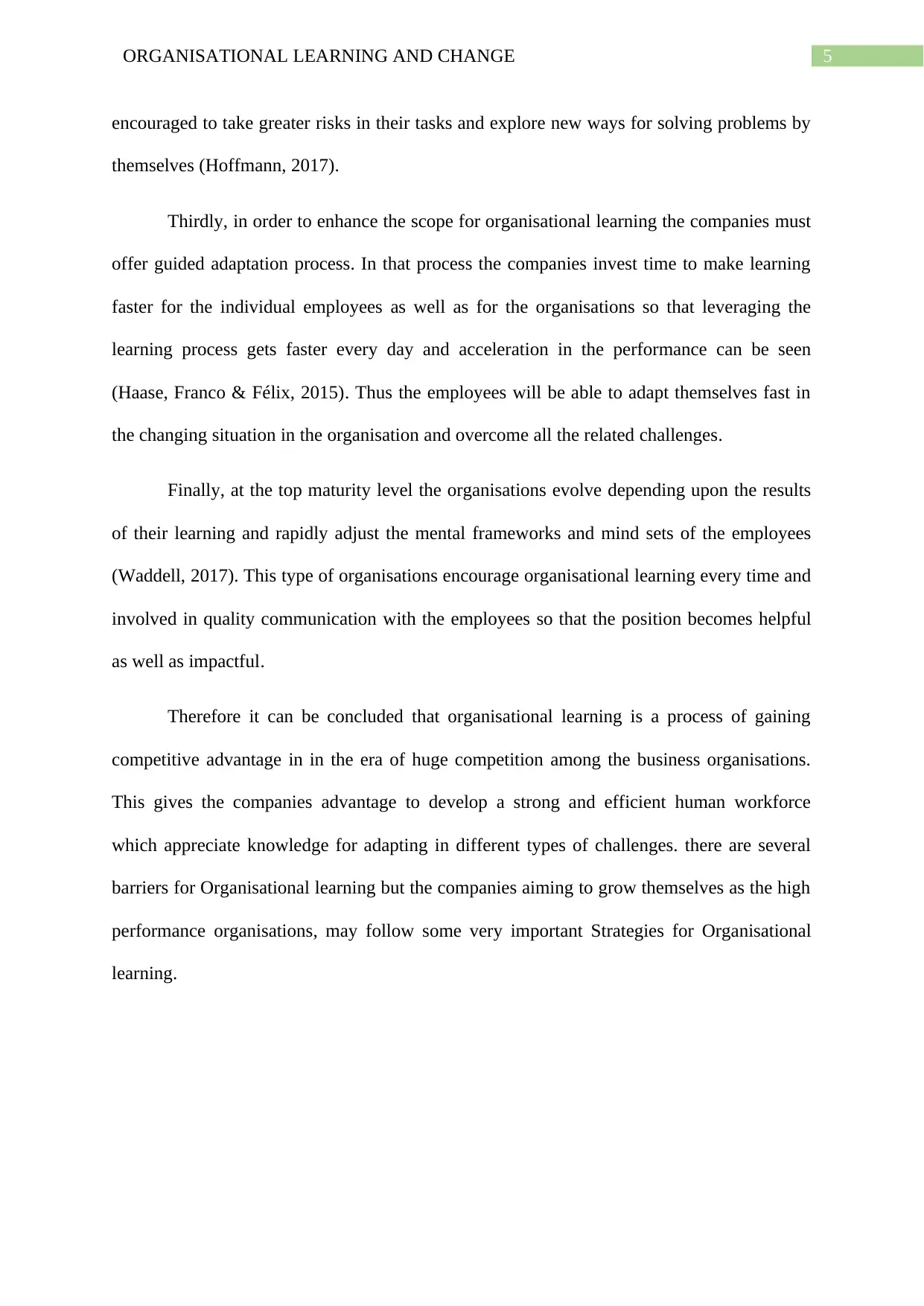
5ORGANISATIONAL LEARNING AND CHANGE
encouraged to take greater risks in their tasks and explore new ways for solving problems by
themselves (Hoffmann, 2017).
Thirdly, in order to enhance the scope for organisational learning the companies must
offer guided adaptation process. In that process the companies invest time to make learning
faster for the individual employees as well as for the organisations so that leveraging the
learning process gets faster every day and acceleration in the performance can be seen
(Haase, Franco & Félix, 2015). Thus the employees will be able to adapt themselves fast in
the changing situation in the organisation and overcome all the related challenges.
Finally, at the top maturity level the organisations evolve depending upon the results
of their learning and rapidly adjust the mental frameworks and mind sets of the employees
(Waddell, 2017). This type of organisations encourage organisational learning every time and
involved in quality communication with the employees so that the position becomes helpful
as well as impactful.
Therefore it can be concluded that organisational learning is a process of gaining
competitive advantage in in the era of huge competition among the business organisations.
This gives the companies advantage to develop a strong and efficient human workforce
which appreciate knowledge for adapting in different types of challenges. there are several
barriers for Organisational learning but the companies aiming to grow themselves as the high
performance organisations, may follow some very important Strategies for Organisational
learning.
encouraged to take greater risks in their tasks and explore new ways for solving problems by
themselves (Hoffmann, 2017).
Thirdly, in order to enhance the scope for organisational learning the companies must
offer guided adaptation process. In that process the companies invest time to make learning
faster for the individual employees as well as for the organisations so that leveraging the
learning process gets faster every day and acceleration in the performance can be seen
(Haase, Franco & Félix, 2015). Thus the employees will be able to adapt themselves fast in
the changing situation in the organisation and overcome all the related challenges.
Finally, at the top maturity level the organisations evolve depending upon the results
of their learning and rapidly adjust the mental frameworks and mind sets of the employees
(Waddell, 2017). This type of organisations encourage organisational learning every time and
involved in quality communication with the employees so that the position becomes helpful
as well as impactful.
Therefore it can be concluded that organisational learning is a process of gaining
competitive advantage in in the era of huge competition among the business organisations.
This gives the companies advantage to develop a strong and efficient human workforce
which appreciate knowledge for adapting in different types of challenges. there are several
barriers for Organisational learning but the companies aiming to grow themselves as the high
performance organisations, may follow some very important Strategies for Organisational
learning.
⊘ This is a preview!⊘
Do you want full access?
Subscribe today to unlock all pages.

Trusted by 1+ million students worldwide
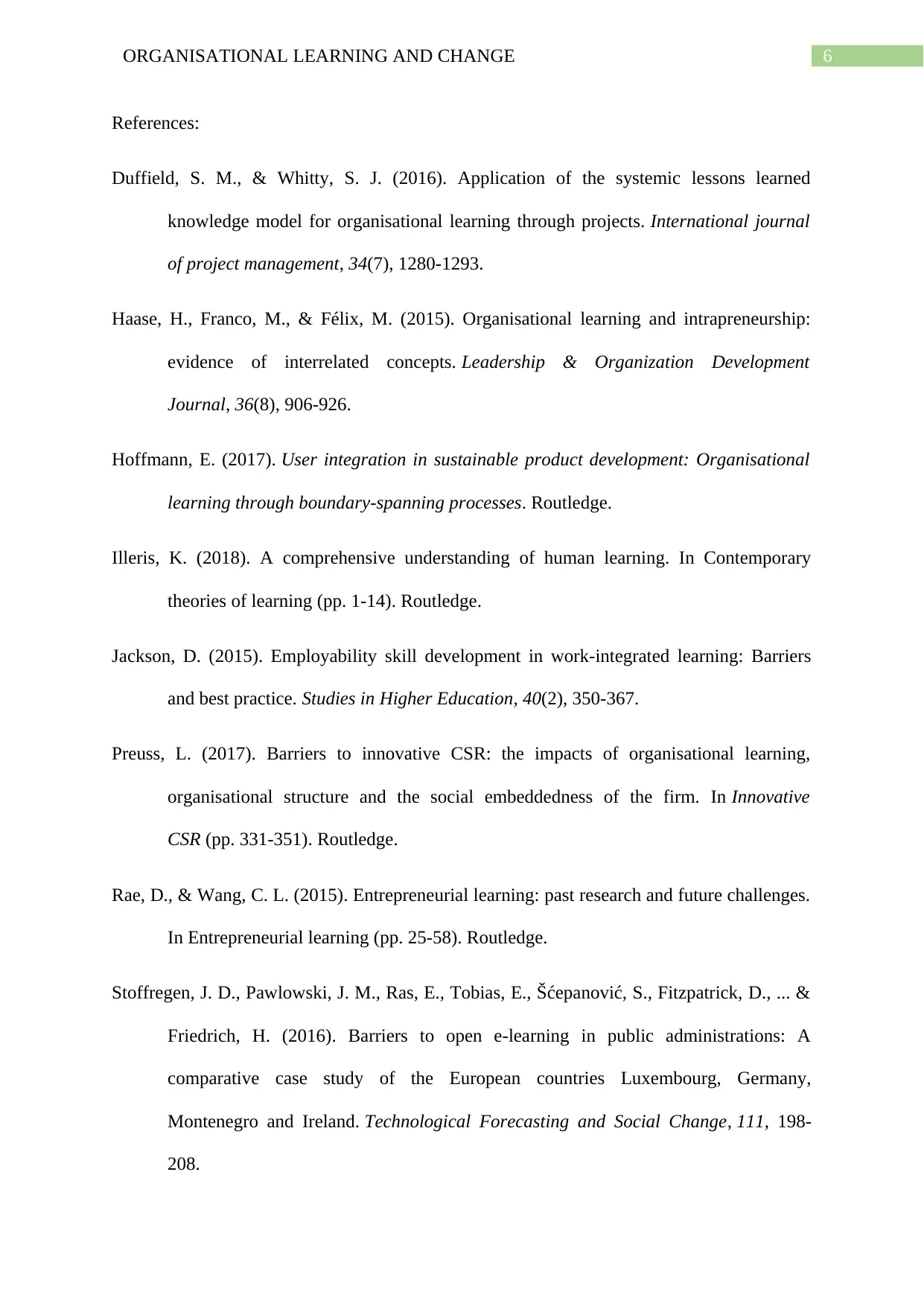
6ORGANISATIONAL LEARNING AND CHANGE
References:
Duffield, S. M., & Whitty, S. J. (2016). Application of the systemic lessons learned
knowledge model for organisational learning through projects. International journal
of project management, 34(7), 1280-1293.
Haase, H., Franco, M., & Félix, M. (2015). Organisational learning and intrapreneurship:
evidence of interrelated concepts. Leadership & Organization Development
Journal, 36(8), 906-926.
Hoffmann, E. (2017). User integration in sustainable product development: Organisational
learning through boundary-spanning processes. Routledge.
Illeris, K. (2018). A comprehensive understanding of human learning. In Contemporary
theories of learning (pp. 1-14). Routledge.
Jackson, D. (2015). Employability skill development in work-integrated learning: Barriers
and best practice. Studies in Higher Education, 40(2), 350-367.
Preuss, L. (2017). Barriers to innovative CSR: the impacts of organisational learning,
organisational structure and the social embeddedness of the firm. In Innovative
CSR (pp. 331-351). Routledge.
Rae, D., & Wang, C. L. (2015). Entrepreneurial learning: past research and future challenges.
In Entrepreneurial learning (pp. 25-58). Routledge.
Stoffregen, J. D., Pawlowski, J. M., Ras, E., Tobias, E., Šćepanović, S., Fitzpatrick, D., ... &
Friedrich, H. (2016). Barriers to open e-learning in public administrations: A
comparative case study of the European countries Luxembourg, Germany,
Montenegro and Ireland. Technological Forecasting and Social Change, 111, 198-
208.
References:
Duffield, S. M., & Whitty, S. J. (2016). Application of the systemic lessons learned
knowledge model for organisational learning through projects. International journal
of project management, 34(7), 1280-1293.
Haase, H., Franco, M., & Félix, M. (2015). Organisational learning and intrapreneurship:
evidence of interrelated concepts. Leadership & Organization Development
Journal, 36(8), 906-926.
Hoffmann, E. (2017). User integration in sustainable product development: Organisational
learning through boundary-spanning processes. Routledge.
Illeris, K. (2018). A comprehensive understanding of human learning. In Contemporary
theories of learning (pp. 1-14). Routledge.
Jackson, D. (2015). Employability skill development in work-integrated learning: Barriers
and best practice. Studies in Higher Education, 40(2), 350-367.
Preuss, L. (2017). Barriers to innovative CSR: the impacts of organisational learning,
organisational structure and the social embeddedness of the firm. In Innovative
CSR (pp. 331-351). Routledge.
Rae, D., & Wang, C. L. (2015). Entrepreneurial learning: past research and future challenges.
In Entrepreneurial learning (pp. 25-58). Routledge.
Stoffregen, J. D., Pawlowski, J. M., Ras, E., Tobias, E., Šćepanović, S., Fitzpatrick, D., ... &
Friedrich, H. (2016). Barriers to open e-learning in public administrations: A
comparative case study of the European countries Luxembourg, Germany,
Montenegro and Ireland. Technological Forecasting and Social Change, 111, 198-
208.
Paraphrase This Document
Need a fresh take? Get an instant paraphrase of this document with our AI Paraphraser
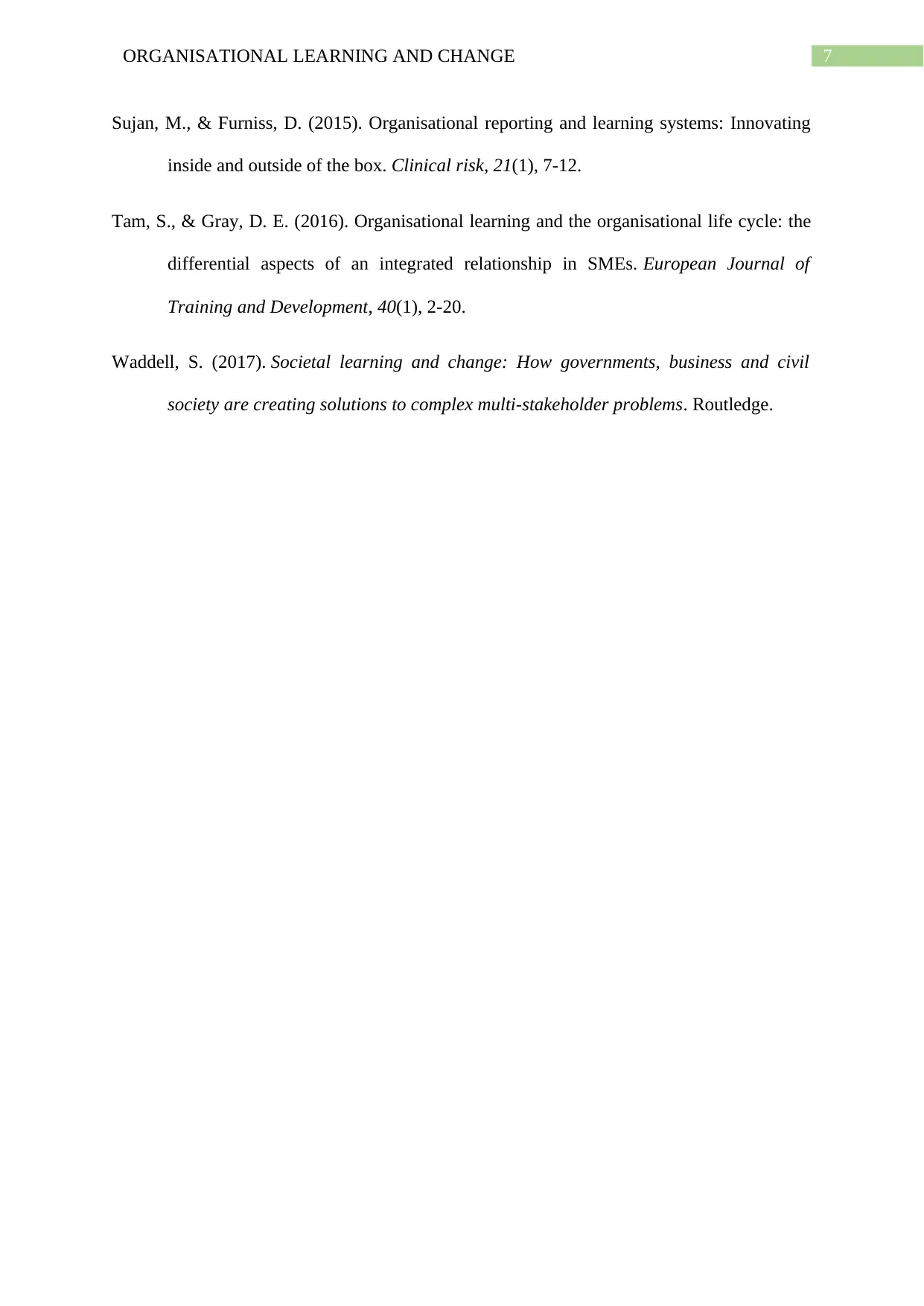
7ORGANISATIONAL LEARNING AND CHANGE
Sujan, M., & Furniss, D. (2015). Organisational reporting and learning systems: Innovating
inside and outside of the box. Clinical risk, 21(1), 7-12.
Tam, S., & Gray, D. E. (2016). Organisational learning and the organisational life cycle: the
differential aspects of an integrated relationship in SMEs. European Journal of
Training and Development, 40(1), 2-20.
Waddell, S. (2017). Societal learning and change: How governments, business and civil
society are creating solutions to complex multi-stakeholder problems. Routledge.
Sujan, M., & Furniss, D. (2015). Organisational reporting and learning systems: Innovating
inside and outside of the box. Clinical risk, 21(1), 7-12.
Tam, S., & Gray, D. E. (2016). Organisational learning and the organisational life cycle: the
differential aspects of an integrated relationship in SMEs. European Journal of
Training and Development, 40(1), 2-20.
Waddell, S. (2017). Societal learning and change: How governments, business and civil
society are creating solutions to complex multi-stakeholder problems. Routledge.
1 out of 8
Related Documents
Your All-in-One AI-Powered Toolkit for Academic Success.
+13062052269
info@desklib.com
Available 24*7 on WhatsApp / Email
![[object Object]](/_next/static/media/star-bottom.7253800d.svg)
Unlock your academic potential
Copyright © 2020–2025 A2Z Services. All Rights Reserved. Developed and managed by ZUCOL.




